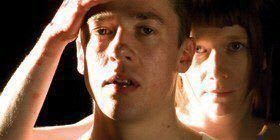Considering it's part of Riverside Studios' Madness season, and staged by a company called Love&Madness, the exploration of madness in this Macbeth is surprisingly superficial.
Lady Macbeth's guilt-crazed sleepwalking scene ("Out, damned spot") is stutteringly paced and almost comically overplayed, full of wailing and collapsing and unjustified emotional U-turns as shorthand for a fragmented psyche. Jody Watson is more enjoyable as an earlier, saner Lady Macbeth whose influence on her husband's decision making is here interpreted as leading him around by his johnson.
Dan Mullane delivers most of Macduff's more anguished lines to the floor, dissipating his sorrow and rage at the murder of his family like earthed lightning and draining his supposedly wracked body of tension.
And Macbeth himself (Will Beer) hardly seems mad at all, taking visions and prophecies in his stride and using the news that he can't be killed as the basis for his battleplans. The closest Beer comes to classical onstage madness is his reaction to Duncan's murder - an event which, unlike the supernatural stuff he simply accepts, is completely under his control.
For that reason, Will Beer's is the most believable portrayal of madness in the production.
We know, in this day and age, that what we once called 'madness' boils down to a difference in perception. This Macbeth's strength is trusting in his perception of things which others - like his wife - simply deny as impossible. Lady Macbeth kills herself because she's unable to reconcile her perception of reality with the events influencing it. Macbeth sensibly accepts the supernatural, and is defeated only because he fails to spot the loophole.
Central to this production's very modern take on Macbeth's madness is the defanging of the witches, here portrayed as singularly unthreatening minstrel-cum-fortune-tellers who play their rhyming couplets as jolly jigs for guitar and violin. The effect - other than to demonstrate that First Witch Arran Glass can't sing - is to downplay the witches' influence and place responsibility for the coming murder and tyranny solely on Macbeth himself.
The updated setting - a gangland East End boozer in the 60s - works about as well as is possible with the text intact, which is to say the parts that don't make sense (are Scotland, England and Ireland now London boroughs?) are at least not distracting.
Iarla McGowan's Banquo is a first act highlight. Soft-spoken and thoughtful, he threatens Macbeth because he's always thinking, unlike his fellow men, who prefer to act.
Despite a few praiseworthy performances and interpretations, this isn't by any means a groundbreaking Macbeth - but credit to Love&Madness for staging a play full of madness in a season about madness and (mostly) not overplaying the madness.
Until 26 July
